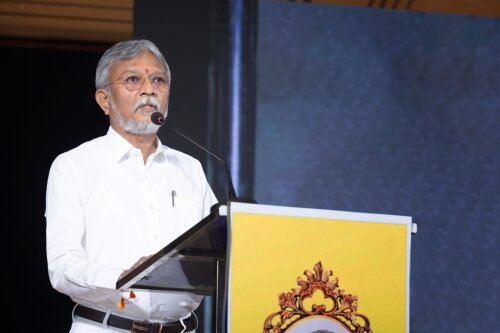Best Collaborative Law Lawyers in Coimbatore
Share your needs with us, get contacted by law firms.
Free. Takes 2 min.
Free Guide to Hiring a Family Lawyer
List of the best lawyers in Coimbatore, India
About Collaborative Law in Coimbatore, India
Collaborative Law is a modern, non-adversarial legal approach to resolving disputes, particularly in family and civil matters, without going to court. In Coimbatore, India, collaborative law offers a structured environment where both parties work together-with their respective legal advisors-to negotiate settlements amicably. This process emphasises open communication, mutual respect, and the collective goal of a fair resolution. The underlying objective is to avoid public litigation and the adversarial process, reducing emotional stress, time, and costs commonly associated with traditional court battles.
Why You May Need a Lawyer
People in Coimbatore may require legal help within the field of Collaborative Law for various reasons:
- Family Disputes: Issues such as divorce, child custody, alimony, and division of property can often be resolved amicably through collaboration.
- Business Disputes: Partners or stakeholders may choose collaborative law to address disagreements, exit strategies, or contract issues without hampering business relations.
- Inheritance and Will Issues: Family members can settle disputes over inheritance collaboratively, preventing long-standing rifts.
- Employment Conflicts: Collaborative methods can also be used to address grievances between employers and employees in workplaces.
- Preserving Relationships: If maintaining an ongoing relationship is important, a collaborative approach helps protect personal and professional ties.
Local Laws Overview
Collaborative Law in Coimbatore functions within the broader framework of Indian law, especially in areas related to family law (such as the Indian Divorce Act, Hindu Marriage Act, and Special Marriage Act), contracts, and property law. While there may not be standalone statutes on collaborative law, the process is supported under the principles of amicable settlement as encouraged by the Code of Civil Procedure (specifically, Section 89), which promotes alternative dispute resolution methods such as mediation and conciliation.
Key aspects to note for the local context:
- Collaborative law agreements are voluntary-both parties must agree to participate.
- Each party has their own collaboratively trained lawyer.
- All parties commit to resolving issues without going to court; if the process fails, new legal counsel may be needed for litigation.
- Confidentiality is respected to ensure open communication.
- The outcome must comply with all applicable Indian laws, and certain agreements (especially in family matters) may require court approval for legal enforceability.
Frequently Asked Questions
What is collaborative law and how is it different from mediation?
Collaborative law is a process where both parties have their own lawyers and commit to work together to resolve disputes without going to court. In mediation, a neutral third party helps the parties negotiate, but does not advise them. Both approaches are non-adversarial, but collaborative law allows for more legal guidance throughout the process.
Is collaborative law recognized by Indian courts?
While not governed by its own statute in India, collaborative law is supported by the judiciary’s encouragement of alternative dispute resolution under Section 89 of the Code of Civil Procedure. Final agreements may need to be submitted to court for approval, especially in family law matters.
What types of cases are best suited for collaborative law?
Collaborative law works well for family law cases (divorce, custody), business separation, contract disputes, employment disputes, and other civil matters where both parties wish to preserve relationships and avoid public litigation.
Do both parties need to have collaborative law-trained lawyers?
Yes, for the process to be effective, both parties should have lawyers trained in collaborative practice to ensure informed decisions are made.
Is the outcome of a collaborative law process legally binding?
Yes, once an agreement is reached, it is usually written and signed by both parties. In many cases, especially family matters, this agreement is then submitted to the appropriate court to become a legally binding order or decree.
Can collaborative law be used for complex financial or business disputes?
Yes, collaborative law can address complex financial and business disputes, often involving financial advisors or other experts as part of the collaborative team.
What happens if the collaborative process fails?
If the parties cannot reach an agreement, the collaborative process ends. Both parties must then seek new legal representation if they wish to proceed with litigation, as collaborative lawyers typically withdraw from the case.
How long does the collaborative law process usually take?
The duration varies, but collaborative law is generally faster than court litigation. Many cases resolve in a few sessions, depending on the complexity of the issues and the willingness of both parties to cooperate.
How confidential is the collaborative process?
The process is strictly confidential to encourage open dialogue. Information shared during the sessions typically cannot be used in court if the process fails, although certain exceptions may apply.
What should I look for in a collaborative law lawyer in Coimbatore?
Seek out lawyers who are specifically trained in collaborative law or alternative dispute resolution, have experience with your type of case, and demonstrate a commitment to ethical, non-adversarial legal practices.
Additional Resources
Here are some helpful resources and organisations related to collaborative law in Coimbatore and India:
- District Legal Services Authority, Coimbatore: Provides information on alternative dispute resolution mechanisms and legal aid services.
- Indian Bar Association: Directory for finding qualified advocates and lawyers trained in dispute resolution.
- Tamil Nadu Mediation and Conciliation Centre: Offers mediation services and information on collaborative dispute resolution practices.
- Family Courts in Coimbatore: For court-approved settlements in family law matters.
- Local Law Colleges and Legal Clinics: Sometimes offer free or low-cost consultations and legal guidance.
Next Steps
If you believe collaborative law may be appropriate for your situation in Coimbatore, consider taking the following steps:
- Clearly identify the issue you wish to resolve and ensure all parties are open to collaboration.
- Research and contact lawyers specialising in collaborative law or alternative dispute resolution in Coimbatore.
- Meet with your chosen lawyer to understand the process, expected costs, and legal implications.
- Work with your lawyer and the other party (and their lawyer) to sign a collaborative agreement and begin negotiations.
- Engage relevant experts, such as financial professionals or counsellors, if needed for clarity and support during the process.
- Once a settlement is reached, ensure the terms are documented and, if required, approved by the appropriate court for full legal enforceability.
- If the collaborative process is unsuccessful, discuss other alternative dispute resolution mechanisms with your lawyer or consider traditional litigation as a final step.
Lawzana helps you find the best lawyers and law firms in Coimbatore through a curated and pre-screened list of qualified legal professionals. Our platform offers rankings and detailed profiles of attorneys and law firms, allowing you to compare based on practice areas, including Collaborative Law, experience, and client feedback.
Each profile includes a description of the firm's areas of practice, client reviews, team members and partners, year of establishment, spoken languages, office locations, contact information, social media presence, and any published articles or resources. Most firms on our platform speak English and are experienced in both local and international legal matters.
Get a quote from top-rated law firms in Coimbatore, India — quickly, securely, and without unnecessary hassle.
Disclaimer:
The information provided on this page is for general informational purposes only and does not constitute legal advice. While we strive to ensure the accuracy and relevance of the content, legal information may change over time, and interpretations of the law can vary. You should always consult with a qualified legal professional for advice specific to your situation.
We disclaim all liability for actions taken or not taken based on the content of this page. If you believe any information is incorrect or outdated, please contact us, and we will review and update it where appropriate.












